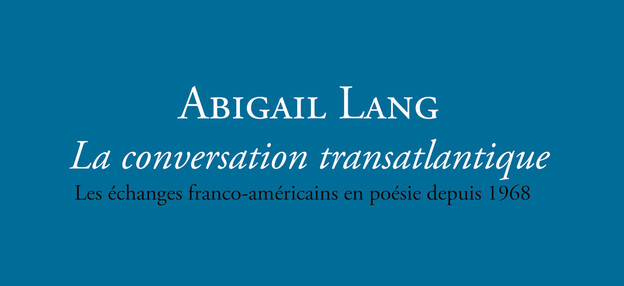
Abigail Lang's La conversation transatlantique

La conversation transatlantique – Les échanges franco-américains en poésie depuis 1968
(The Transatlantic Conversation: The French-American Exchange in Poetry after 1968)
Published by Les Presses du Reel (336 pages)
American poetry and French poetry have enjoyed a “special relationship” — one that is exceptional compared to the relation of each national poetry to other national poetries. While this may have its source in the reception of Whitman and Poe, and the relation of Baudelaire and Mallarmé, the continuation of this special relation after 1968 has never been so fully addressed until this new work.
La conversation transatlantique; Échanges franco-américains en poésie depuis 1968 offers a rare combination of critical acumen and precise historical and bibliographic detail (it will be source for any future work on the topic and is notable for tracking a number of small press citations). See, for example, the detailed study of the poetry/poetics and translation activities at Royaumont and the related publications: a remarkable story, beautifully told.
A singular advantage of this book is that it relies on the testimony of poets in interviews and essays as a primary source in charting its complex literary history. In this telling, David Antin, Emmanuel Hocquard, Jacques Roubaud, Jean-Marie Gleize, and Pierre Alferi / Olivier Cadiot (etc.) become trusted guides, alongside scholars such as Marjorie Perloff and Serge Fauchereau (etc.).
In one striking section, Lang notes the multivalent significance of Charles Reznikoff’s Testimony for contemporary French poetry). Lang’s work suggests the centrality of work in the US that is often not as fully acknowledged in America, itself a significant feature of the US/French relation. This provides a valuable corrective to dominant mainstream US tastes, by providing a reliable guide to what is truly innovative in modernist and postwar American poetry. Indeed, Lang is able to chart the different significance of Testimony for different generations of French poetry. From an American perspective, this is not only signification for the reception history of the work but enriches any formalist or aesthetic reading. In other words, Lang is able to illuminate aspects of Resnikoff’s work (to use one example) that have not been fully addressed in the US.